|
|
|
Sort Order |
|
|
|
Items / Page
|
|
|
|
|
|
|
| Srl | Item |
| 1 |
ID:
031604
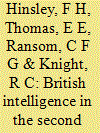

|
|
|
|
|
| Publication |
London, Her Majesty's Stationery Office, 1981.
|
| Description |
xvi, 850p.: maps.Hbk
|
| Standard Number |
0116309342
|
|
|
|
|
|
|
|
|
|
|
|
Copies: C:1/I:0,R:0,Q:0
Circulation
| Accession# | Call# | Current Location | Status | Policy | Location |
| 019930 | 940.548541/HIN 019930 | Main | On Shelf | General | |
|
|
|
|
| 2 |
ID:
117390


|
|
|
|
|
| Publication |
2012.
|
| Summary/Abstract |
SO FAR THE GERMANS have known about the crisis in the eurozone mainly from newspaper headlines and popular TV programs. In Germany itself, all is still relatively quiet. According to the latest opinion polls, almost 60% of German citizens are convinced that in the coming year their living standards will improve and they will keep their jobs.
True, the German economy is slowing but, according to forecasts, it will continue to grow in the current year as well. Unemployment is at a 20-year low (5.6% of the working-age population in May 2012). Over the past year, wages have slightly increased (+1.1%), as well as labor productivity (+1.6%). The budget deficit has been reduced to an acceptable level: 1% of GDP. Under the medium-term fiscal plan adopted in June 2012, the German government expects to balance the Federal budget by 2016.
|
|
|
|
|
|
|
|
|
|
|
|
|
|
|
|
| 3 |
ID:
133646
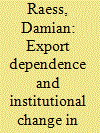

|
|
|
|
|
| Publication |
2014.
|
| Summary/Abstract |
This article explores the adjustment of wage bargaining institutions to international trade in Germany. Embracing IPE as opposed to CPE lenses yields a novel interpretation of change in the institution of wage bargaining. Export dependence of a sector, we argue, has destabilizing effects for industry-wide bargaining by sparking an intra-sectoral cleavage between domestic- and export-oriented enterprises. Specifically, the greater the degree of export dependence of a sector, the greater the degree to which domestic-oriented enterprises within that sector will abandon collective bargaining. We also explain how workplace employee representation through works councils mitigates this effect, such that the presence of works councils helps domestically oriented firms to hold to collective bargaining agreements in the face of a sector's deepening exposure to export markets. These claims find empirical support in the history of labor relations developments in the metal industry and, especially, in extensive analysis of a cross-section of establishments. Our findings attribute major responsibility to the firms driving globalization for undermining collective bargaining institutions and suggest that economic globalization is a cause of dualization. In all, the article provides fresh ammunition for a version of globalization-induced institutional convergence. [Correction added after online publication on May 28, 2014: "conversion" changed to "convergence" in preceding sentence.]
|
|
|
|
|
|
|
|
|
|
|
|
|
|
|
|
| 4 |
ID:
047667
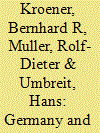

|
|
|
|
|
| Publication |
Oxford, Oxford University Press, 2000.
|
| Description |
xliii, 1209p.: ill.Hbk
|
| Contents |
Vol. V.: Organization and mobilization of the German sphere of power.
Part I.: Wartime aministration, economy, and manpower resources 1939-1941
|
| Standard Number |
0198228872
|
|
|
|
|
|
|
|
|
|
|
|
Copies: C:1/I:0,R:0,Q:0
Circulation
| Accession# | Call# | Current Location | Status | Policy | Location |
| 043528 | 940.540943/KRO 043528 | Main | On Shelf | General | |
|
|
|
|
| 5 |
ID:
114117
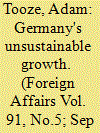

|
|
|
|
|
| Publication |
2012.
|
| Summary/Abstract |
Germany seems like Europe's lone island of fiscal stability, but trouble lurks under its impressive export-fueled growth. An obsession with debt and austerity has blocked domestic investment as the country has ignored problems such as a shrinking work force and outdated infrastructure. Germany needs to borrow and spend more or face the end of its economic miracle.
|
|
|
|
|
|
|
|
|
|
|
|
|
|
|
|
| 6 |
ID:
130971
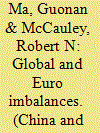

|
|
|
|
|
| Publication |
2014.
|
| Summary/Abstract |
We analyze global and euro area imbalances by focusing on China and Germany as large surplus and creditor countries. In the 2000s, domestic reforms expanded the effective labor force, restrained wages, shifted income toward profits and increased corporate saving. As a result, the Chinese and German current account surpluses widened, and that of Germany has proven more persistent, with subdued domestic investment. China is an early-stage creditor, holding a short equity position and a long position in safe debt. Germany's balanced net debt and equity claims mark it as a mature creditor that provides insurance to the rest of the world. China pays to lay off equity risk, while Germany, by contrast, harvests a moderate yield on its net claims. In both economies, the shortfall of the net international investment position from cumulated current account surpluses arises from exchange rate changes, asymmetric valuation gains, and, in Germany's case, credit losses.
|
|
|
|
|
|
|
|
|
|
|
|
|
|
|
|
| 7 |
ID:
151630


|
|
|
|
|
| Summary/Abstract |
This article focuses on the interplay between the political authorities and economic actors in the Federal Republic of Germany in the process of establishing relations with the People's Republic of China after 1949. Within this framework, the article will assess the role played by the Ost-Ausschuss der Deutschen Wirtschaft (Eastern Committee of German Economy), a semi-official organization recognized by the West German government. Both the ability of German economic actors and China's urgent need for economic contact with the West caused German-Chinese trade relations to circumvent the strict non-recognition policy followed by the West German government. The article also argues that, while economic relations heralded official recognition of the People's Republic of China by other Western European countries, in the case of the Federal Republic of Germany a division between the two spheres was finally accepted by the major actors involved, and ended only after the change of attitude imparted by the Nixon presidency in the United States during the early 1970s.
|
|
|
|
|
|
|
|
|
|
|
|
|
|
|
|
| 8 |
ID:
123253
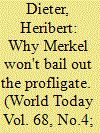

|
|
|
|
|
|
|
|